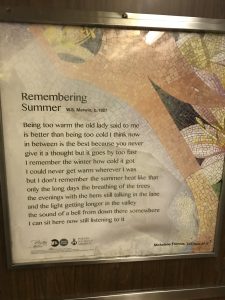Andrew Grace is the poet that I chose to write about because of my interest in his poem called “Not a mile”; and I also find him very relatable as a person. Grace grew up in Illinois on a farm right outside of the town Urbana where he lived with third-generation farming family. Growing up, Grace’s main interest was punk rock music. His intentions weren’t really focused on becoming a poet because he hadn’t known for sure if that was what he wanted to do however he claimed that he was somehow hoping to be a poet at some point in his life, since living on the farm, he always felt a void that needed to be filled in and now as a poet and having a way of expressing his thoughts, he has been able to fill that void. Grace recalled only reading three poems his whole life before attending college. Grace attended Kenyon College in 1977 where he studied poetry, with little knowledge of what it entails. While in college, his father died which pushed him even further into poetry; additionally, the loss of his father became his driving force to pursue this career. While attending Kenyon college he met his wife in his junior year who he now has formed a family with, with the addition of their daughter. According to his biography, the book “Sancta” is one his most famous works which was published in 2012, a book that is about the landscape that he grew up in. His work had also been recognized by many famous poets such as Duncan, Eigner, Oppen, Bronk, Niedecker, Revell, Giscombe, Gizzi, and Hillman. When describing himself, Grace seems to be in disbelief at how far he has come in his career. He now has a PhD and is a candidate at the University of Cincinnati. I think that Andrew Grace is a phenomenal poet and I can see why other readers like myself would be drawn to his work; not only he came from a small and became very successful, but he was able to fill an emotional void with a fulfilling career by following his passion which makes him even more relatable. As a reader that’s from a small town as well, reading his biography made me feel like I can accomplish anything that I put my mind to and know that other readers may feel the same way. It’s also an example of how setbacks can sometimes be a push; the same way his father’s death motivated him to achieve his goals.
Citation:
“Sancta.” Ahsahta Press, ahsahtapress.org/book/andrew-grace/.




